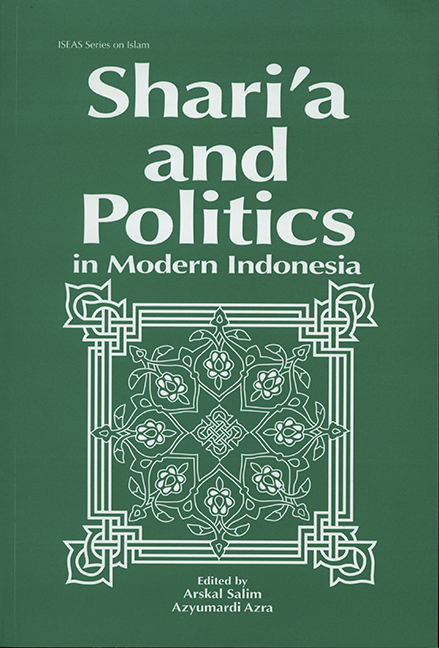Book contents
- Frontmatter
- Contents
- Acknowledgments
- List of Contributors
- Glossary
- 1 INTRODUCTION: The State and Shari'a in the Perspective of Indonesian Legal Politics
- 2 LAW AND POLITICS IN POST-INDEPENDENCE INDONESIA:A Case Study of Religious and Adat Courts
- 3 THE STATE AND SHARI'A IN INDONESIA
- 4 THE STATE'S LEGAL POLICY AND THE DEVELOPMENT OF ISLAMIC LAW IN INDONESIA'S NEW ORDER
- 5 THE INDONESIAN MARRIAGE LAW OF 1974: An Institutionalization of the Shari'a for Social Changes
- 6 INDONESIA'S 1989 RELIGIOUS JUDICATURE ACT: Islamization of Indonesia or Indonesianization of Islam?
- 7 THE POLITICAL BACKDROP OF THE ENACTMENT OF THE COMPILATION OF ISLAMIC LAWS IN INDONESIA
- 8 ISLAMIZING CAPITALISM: On the Founding of Indonesia's First Islamic Bank
- 9 FATWA AND POLITICS IN INDONESIA
- 10 ZAKAT ADMINISTRATION IN POLITICS OF INDONESIAN NEW ORDER
- 11 ISLAMIC VALUES, LAW AND EXPECTATIONS IN CONTEMPORARY INDONESIA
- 12 EPILOGUE: Shari'a in Indonesia's Current Transition: An Update
- APPENDICES
- Bibliography
- Index
8 - ISLAMIZING CAPITALISM: On the Founding of Indonesia's First Islamic Bank
Published online by Cambridge University Press: 21 October 2015
- Frontmatter
- Contents
- Acknowledgments
- List of Contributors
- Glossary
- 1 INTRODUCTION: The State and Shari'a in the Perspective of Indonesian Legal Politics
- 2 LAW AND POLITICS IN POST-INDEPENDENCE INDONESIA:A Case Study of Religious and Adat Courts
- 3 THE STATE AND SHARI'A IN INDONESIA
- 4 THE STATE'S LEGAL POLICY AND THE DEVELOPMENT OF ISLAMIC LAW IN INDONESIA'S NEW ORDER
- 5 THE INDONESIAN MARRIAGE LAW OF 1974: An Institutionalization of the Shari'a for Social Changes
- 6 INDONESIA'S 1989 RELIGIOUS JUDICATURE ACT: Islamization of Indonesia or Indonesianization of Islam?
- 7 THE POLITICAL BACKDROP OF THE ENACTMENT OF THE COMPILATION OF ISLAMIC LAWS IN INDONESIA
- 8 ISLAMIZING CAPITALISM: On the Founding of Indonesia's First Islamic Bank
- 9 FATWA AND POLITICS IN INDONESIA
- 10 ZAKAT ADMINISTRATION IN POLITICS OF INDONESIAN NEW ORDER
- 11 ISLAMIC VALUES, LAW AND EXPECTATIONS IN CONTEMPORARY INDONESIA
- 12 EPILOGUE: Shari'a in Indonesia's Current Transition: An Update
- APPENDICES
- Bibliography
- Index
Summary
An anthropologist, huh? Then you must agree with what Clifford Geertz had to say about Indonesian Muslims. Do you?
I had just sat down in the waiting room of the newly formed Union of Indonesian Muslim Intellectuals (ICMI), awaiting the arrival of one of the organization's leaders, and I was startled by the unexpected appearance and questioning of this gentleman, a low-ranking officer in ICMI. It was July 22, 1992, my first day in Jakarta. I had traveled to this office among the modern buildings on Jalan Thamrin to interview a high-ranking ICMI officer about his role in the recent establishment of the Bank Muamalat Indonesia (BMI), Indonesia's first official Islamic bank. The officer hadn't arrived yet, so, hot, jet-lagged from my travel, and anxious about the upcoming interview, I sat down, hoping to use the minutes before his arrival to collect my thoughts. Having heard I was an anthropologist, however, this other gentleman, who had entered the waiting room and abruptly sat down beside me, seemed determined to get an answer.
Well, uh, no, but, uh…. Geertz said many things about Indonesian Muslims, some important and others perhaps wrong. I guess whether I agree with Geertz really depends on which of his ideas you're talking about.
My interrogator cocked his head to the side with a skeptical smile, obviously unconvinced by my feigned ignorance. He challenged me again:
Anthropologists believe that Muslims, the government, and the people [masyarakat] can never work together. They must always compete, the government fearing Islam, Muslims opposing the government, and the people rejecting Islamic devotion. The purpose of our organization is to prove Geertz wrong. Rather than separate and opposed, as anthropologists believe, we want to demonstrate that the three social groupings [aliran] Geertz described – priyayi, santri, and masyarakat – can work together for the development of Indonesia and the growth of the Muslim community [ummat]. Priyayi [government officials] don't have to fight with santri [practicing Muslims], and Islam can work for the betterment of all the people. The Geertz thesis is false, and we will show that anthropology is wrong.
- Type
- Chapter
- Information
- Shari'a and Politics in Modern Indonesia , pp. 148 - 167Publisher: ISEAS–Yusof Ishak InstitutePrint publication year: 2003



